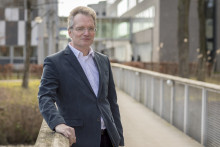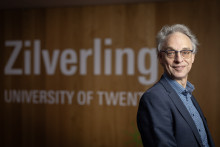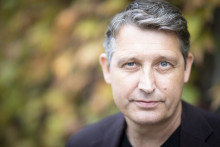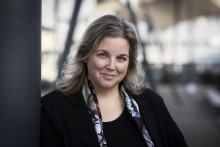What awaits the EEMCS faculty in 2023?
'The past few years in particular have shown how unpredictable things can get, with first corona and then the war in Ukraine. Knowing that, according to the Chinese calendar, we are entering the year of the Rabbit, I am curious to see what rabbits will be pulled out of the proverbial hat in 2023. As far as I can see right now, for EEMCS it will be the year of big projects. So many initiatives have been started in recent years that, in a way, we should not do too many new things. Of course there are ambitions to start new things, but above all we need to keep focus on the initiatives that have already been started.'
On what, for example?
'Take for instance the Growth Fund, a number of large applications in which the faculty is involved have been granted. And other project applications are being submitted. The Growth Fund involves large sums of money, which we have to let find their way properly. We also have some centres where we expect developments: the Robotics Centre mentioned by fellow dean Bart Koopman, the Centre for Safety and Digitalisation in Apeldoorn, research centres such as TUCCR and BRAINS... And then I almost forget plans in the field of sports data: a cooperation agreement the UT signed with FC Twente and plans with Saxion for a joint sports innovation centre. Moreover, a new round of sector plans is coming up and we are going to grow in our personnel as a result.'
And in the field of education?
'Life Long Learning is definitely going to play a role - we have appointed professor Mariëlle Stoelinga as scientific director in that area. The joint bachelor's programme Creative Technology with VU University will start in September, where it will be exciting to see what we can expect in terms of intake. The master's in Robotics will also start. Moreover, some programmes have growth ambitions: Applied Mathematics has a new specialisation called AI4Health. And Electrical Engineering wants to double its annual intake to around two hundred students.'
Another EEMCS programme, Technical Computer Science, actually introduced a numerus fixus last year because growth could not be kept up with...
'It is always a balancing act between what the labour market needs and the quality you can offer as a programme. If we want to meet demand, we would have to train more than a thousand students a year. Technical Computer Science simply ran into limits, both in terms of physical space and staff. A numerus fixus is a drastic measure, but it did have an effect. In our case, we also saw a side effect as a result: in the Business Information Technology programme, the intake increased. The Vrije Universiteit, for instance, did not have a fixus for their Computer Science programme and experienced the consequences.'
All in all, EEMCS is doing well, by the sound of it?
'A lot is running like clockwork and we can present a positive picture. That is immediately a pitfall: if things are going well on average, you have to be careful that nothing is lost at the edges. Moreover, making sure people know their way around is a point of concern.'
Why this concern?
'I think it is mainly a corona effect, combined with the growth we experienced. Besides, we have become more diverse and international. It is no longer so obvious to everyone how the wheels spin and where they can find the information relevant to them. There does seem to be a gap between people and the system, which we need to bridge. We should be explicit as possible in our communication.'







